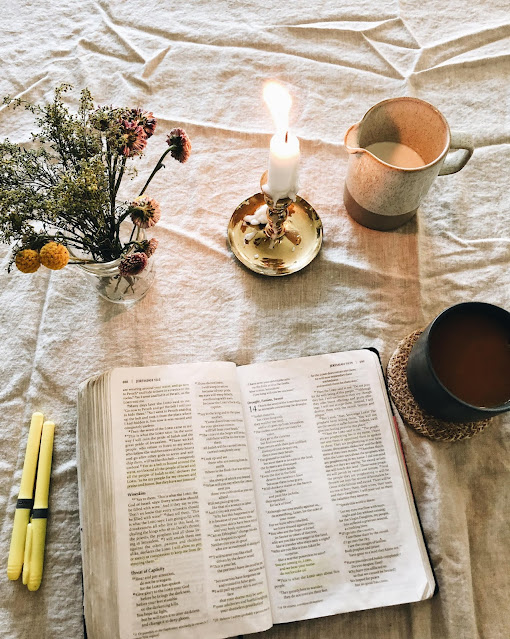Thoughts on reading through the Old Testament
For nearly two years now, I have been studying my way through the Old Testament in chronological order. That is, I read Scripture in the order in which the recorded events occurred over thousands of years, rather than the way they are presented in my Bible.
I took breaks throughout this study (hence why it took so long!), delving into other studies for my quiet times when I was feeling I needed a change... or that it was becoming a chore (let's be candid now, this can happen!). In fact, Phylicia Masonheimer provides a thoughtful reflection on when to quit a Bible reading plan, which you might enjoy.
In my Christian life, I've rarely endeavored to read the entire Bible. Generally, I deep dove in specific books of the Bible or topical studies during my quiet times (quiet times referring to moments of individual Bible study, worship and prayer). It was only in 2015 that I first committed to read it in a year, from cover to cover. This was a wonderful experience. A couple years later, I recognized I wanted a better understanding of the history and narrative arc of God's Word. So I committed to reading it again, but this time with a reading plan that outlined the historical order of events. The chronological study of Scripture was new to me, and I have to say it was a formative experience.
The cycle of covenants, humanity's sin, God's grace and forgiveness (over and over again) was at times grueling and drawn out. But I have to say, I learned a lot. I feel as though I have a better understanding of the background of Old Testament books, who different actors are, and some of the key historical events that shaped God's people. But I also learned a lot about how foundational Scripture reading is, and the benefits of reading it chronologically.
I thought I'd share a few main takeaways here, for those it might interest.
1. Committing to a lengthy Bible study plans bolsters good habits
I was once told to look at the people I most admire in the world and see what they have in common, and replicate this trait or habit in my own life. In my case, the mentors, family members and figures I most respect nearly all share in the foundational practice of morning devotions and quiet times. I woke up every morning of my childhood and adolescence to my mother and father in our living room, with lukewarm coffee at their side, each in deep study of their tattered Bibles. This practice is something I thus value in my own life.
I long struggled to really commit to this life-giving rhythm. Having observed this discipline in my parents, I wanted desperately to begin each day with time especially carved out to read Scripture, journal, pray. But I had a hard time doing it consistently -until I discovered the immense benefits of (grace-filled) goal-setting and longer Bible study plans.
I'm by no means always persistent with daily studies of the Bible (ask me about how this week is going...), but I do think that having a Bible-reading goal and plan is a good rubric to prioritize this spiritual discipline. It generally helped me grow in diligence and make room for quiet times in God's Word morning after morning. And Bible study plans always prove to be more fruitful than randomly selecting a Scripture to read without any guide or overarching objective. I felt as though I better understood the texts as I read through them systematically.
I say my goal-setting was "grace-filled" because I read at my own pace, and I remembered the ultimate goal of these devotions. Ultimately, the objective is to grow closer to God and let His Word shape and instruct me. When I missed a day, I did not allow myself to wallow in guilt. However, I did recognize that my days usually felt more pleasant and rooted when starting off with morning devotions. But I really do have to say this: committing to a lengthier Bible study plan was motivating, as I tracked progress and worked my way through God's story.
2. Reading Scripture chronologically highlights God's plan
This approach to biblical study invited me to better grasp the narrative arc of the Bible. We easily forget the Bible is a collection of sacred writings, with books mostly grouped by genre. We subsequently lose view of the overarching narrative of Scripture, as the texts can seem somewhat incongruous, or like a funny assortment of readings.
Studying the Bible in chronological order, however, accentuates patterns in God's story. It provided me with a better understanding of God's plan to restore the shalom described in His original creation: humankind's right relationship with the Earth, others and God Himself. This peace was disrupted when sin entered the world, and the Old Testament details God's work of restoring it. This culminates to the coming of Jesus, ushering in a new era where sinner and God are reconciled through the work of the cross. Of course, I didn't get to that part yet, but I did delve into the beginning of this plan unfolding over thousands of years: covenants, genealogies, prophesies of the Messiah...
I think, actually, that the gospel story is most strikingly displayed when approached chronologically, instead of when one studies Scripture cover-to-cover, by literary genre, or through book-specific or thematic study plans. These are all good models, of course. But I found myself awestruck by how clear the "big picture" of God's story was through chronological study. In my experience, reading about these events in the order they happened gives a crisper, broader understanding of who God is and what His plan is for us.
3. Quantity time over quality time isn't always bad
This might sound counter-intuitive, but I actually think it can apply to time in God's Word. At the beginning of my time reading the Old Testament chronologically, I was in a slower season of life. I took over an hour every day to read the Bible passages, consult different commentaries, read a devotional thought, and take notes. This was wonderful quality time in God's Word. But as soon as life got a bit busier, I didn't consistently read my Bible because "I didn't have the time to do it well." I've come to realize this isn't a good mindset.
Of course, a certain amount of time, focus and reverence is needed to read Scripture. That goes without saying. One shouldn't just skim or read Scripture for the sake of it reading it, as this wouldn't really be a fruitful or formative experience. So please don't read this as an encouragement to conceptualize Bible reading as a checklist item! But I do believe that showing up repeatedly to read Scripture is an essential marker of discipleship. It shapes you. It deepens your familiarity with the Bible. It plants seeds, even when commentaries and extensive notetaking aren't involved.
When we get caught up in whatever constitutes "quality" time in God's Word, and recoil or make excuses because of the thinness of our time or energy, we miss out. We neglect the great invitation to fellowship with God daily through His Word. I delight in the days I can take my time and delve deep in the passages I'm studying. But I have learned to delight in simply reading the Word, too. At the end of the day, followers of Jesus need both quality and quantity time in Scripture. I would encourage you, however, not to neglect the latter when the former is hard to come by.
4. I need the Old Testament, too
I find it quite fitting that the end of this study coincided with the beginning of Advent. I have to say, although the Messiah and person of Jesus is prophesied and waited for in the Old Testament, I longed for Him. I longed for the joy and rest wrapped up in the fulfillment of the law and prophecies. I longed for the peace and hope found in the pages of the New Testament. I approach Advent now with an acute awareness of my need for Christ's coming. Too, I am so grateful to have read through these thousands of pages of anticipation and waiting. This time spent in the Old Testament made me realize time and time again that I am Israel, in desperate need of her Saviour.
It's as simple as that: our track record isn't so great, but God's mercies are new morning after morning. The depth of Israel's sins was always met with the height of God's love and grace. And mine is too.
Beyond this, as I studied the relationship of God and His people in the Old Testament, I can rejoice in how life-changing the gospel detailed in the New Testament really is. It gives me a new identity! No longer are we bound by our sin in the way Israel was: Christ's righteousness dwells within us. We are grafted to Him.
This experience has shown me that believers need to contemplate the patterns of covenants, anticipation and rebellion in the Old Testament to grasp how truly incredible Christ's coming is. As you read through Genesis to Malachi, you come to see how revolutionary it is for God's people to now be identified as saints, fully redeemed through the work of the cross. We still struggle with sin, no doubt, but God fulfilled the promises of the prophets--making us new creatures, with new hearts. These truths, largely outlined in the New Testament, are all the more poignant when one understands the context of the Old Testament.
Some church movements focus largely on the New Testament and Jesus' teachings, largely ignoring the importance of the Old Testament in Christian thought and practice. But we simply can't disengage with the Old Testament. Neither church history nor the Bible itself can support that. Of course, we can contextualize, and we can use basic exegetical principles to understand what laws and covenants apply to us now. Yet, we miss out when we fail to see that we need the Old Testament, too.
Personally, a two-year study of these books elucidated why I desperately need the beginning of the Bible just as much as the end. I hope the entirety of this post conveyed this.
Resources I used
- I used this Bible reading plan, but there are many others out there!
- The Bible project videos whenever I started a new book
- She Reads Truth devotionals when I longed for accessible, concise reflections on the passages I was reading.
- Commentaries: online I used EnduringWord.com but I highly recommend the IVP Press Old Testament commentary





Comments